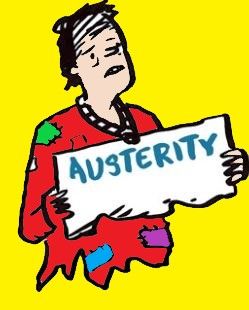Summer Economic Statement: Capital Investment welcome, but austerity risk remains

On Wednesday, 14th July 2021, the Government published the Summer Economic Statement, setting out the economic position prior to Budget 2022. Social Justice Ireland welcomes the commitment to increased capital spending but warns that a focus on deficit reduction over decent services and infrastructure will lead to austerity.
The Summer Economic Statement (SES) begins with a narrative of "fiscal trade-offs" and finite resources. The medium-term budgetary strategy is to reduce the deficit by 2025. Of the five priorities set out in the Opening Statement, only one refers to infrastructure investment to address the " longer-term challenges facing the economy, such as an ageing population, the digital transition, and climate change". Poverty and income adequacy are not mentioned at all.
Budget 2022
The Expenditure Ceiling for 2022, outlined in the SES, is expected to be €88.2 billion. The core budget package for Budget 2022 is €4.7 billion, of which €3.2 billion will be spent on maintaining existing levels of service, demographic change and public pay, leaving €1.5 billion will be available for new measures (of which €500 million will be tax measures). This leaves €1 billion for Budget 2022. While that seems like a lot, when we consider the reforms needed in areas such as housing, health, welfare, education and job creation, there isn't much to go around.
In our Budget Choices - Delivering a Fair Recovery, Social Justice Ireland propose a series of tax reforms that would broaden the tax base and increase revenue to the Exchequer, "topping up" the €1.5 billion and creating more space for real investment.
- Reforming and broadening the tax base
There are a number of approaches available to Government in reforming the tax base, including:
- Reforming Tax Expenditure
- A Minimum Effective Tax Rates for Higher Earners
- Reform of Corporation Taxes
- Introduction of a Site Value Tax
- Taxing Second Homes
- Taxing Empty Houses and Underdeveloped Land
- Taxing Windfall Gains
- Supporting a Financial Transactions Tax
- A Minimum Effective Rate of Corporation Tax
Social Justice Ireland welcome recent measures at a European level to reform corporation tax and make it fairer. For many years we have called for the adoption of a Minimum Effective Rate of Corporation Tax and welcome the growing international acknowledgement of this as the only practical and fair route to address this issue. We have proposed an effective rate of at least 10% and believe Budget 2022 should commence the adjustment to this rate by adopting a rate of 6 per cent for 2022/23. Such a rate would raise over €1 billion each year.
- Developing a fairer taxation system
There is an obvious need for fairness within our tax system when we consider how some instruments, particularly some tax expenditures, disproportionately benefit those on higher incomes. Social Justice Ireland believes that this should be a central objective of any forthcoming reform of the taxation system, with priority given to the following:
- Standard Rating Discretionary Tax Expenditures
- Favouring Fair Changes to Income Taxes
- Introducing Refundable Tax Credits
- Reforming Individualisation
- Making the Taxation System Simpler
In other publications we have outlined the details of our proposal for a national tax take target set on a per-capita basis; an approach which minimises some of the distortionary effects that have emerged in recent years. Our target is calculated using CSO population data, ESRI population projections, and CSO and Department of Finance data on recent and future nominal overall taxation levels. It also incorporates an adjustment for current windfall corporation tax revenues. The target is as follows:
Ireland’s overall level of taxation should reach a level equivalent to €15,000 per capita in 2017 terms. This target should increase each year in line with growth in GNI*.
Increasing the overall tax take to this level would require a number of changes to the tax base and the current structure of the Irish taxation system. While increasing the overall taxation revenue to meet this new target would represent a small overall increase in taxation levels (about €1,100 per person), it is one that is unlikely to have any significant negative impact on the economy.
Such taxation reforms would generate much-needed income for real investment in economic and social change. To summarise our Key Packages for Budget 2022:
- Housing: €4,529m prioritising increased investment in social housing, an end to the Help to Buy Scheme and investment in homelessness prevention. (p. 8 of Budget Choices)
- Rural, Regional and Community Development: €458m investment prioritising the rollout 400 remote working hub and supporting infrastructure, as well as additional investment in rural transport, and the development of rural enterprise and tourism, and increased funding for the community and voluntary sector. (p. 10 of Budget Choices)
- Healthcare and disability: €1,777m investment prioritising social and community care, disability, mental health and Sláintecare. (p. 11 of Budget Choices)
- Education: €274m investment in areas such as reducing class sizes, adult literacy, DEIS, skills development, community education, digital education and higher education. (p. 12 of Budget Choices)
- Sustainability: €239m investment including funding for renewable energy, biodiversity, Just Transition and the Circular Economy. (p. 14 of Budget Choices)
- Children and Families: €734m focused on Early Childhood Care and Education, paternity leave, a Living Wage for childcare workers and implementation of the White Paper on Direct Provision. (p. 12 of Budget Choices)
- Pensions and Older People: €1,041m prioritising a universal pension, investment in social care and Home Care Packages and increased funding for nursing homes. (p. 13 of Budget Choices)